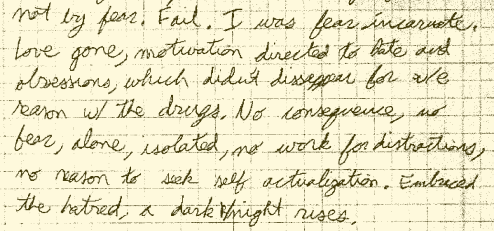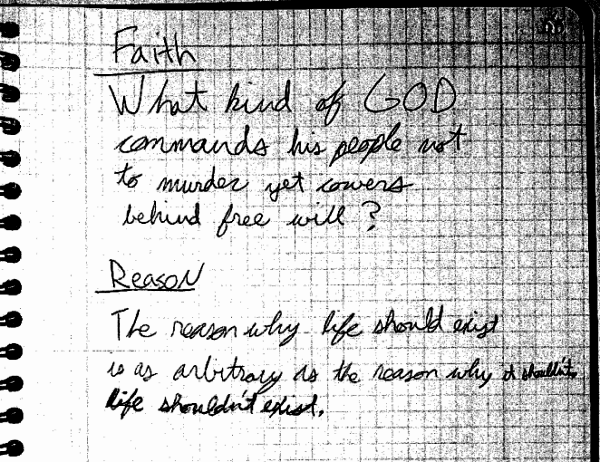
One question lies at the center of the Aurora theater shooting trial: Was James Holmes legally insane – incapable of telling right from wrong – at the time of the shooting?
Last week, prosecutors released the notebook he wrote and sent to his psychiatrist before the attack. The prosecutor argues the notebook proves Holmes premeditated the murders with criminal intent; the defense argues the writings are clear evidence that he was psychotic and unable to determine right from wrong.
The Marshall Project, a nonprofit journalism organization covering the criminal justice system, presented the question to Dr. Jeffrey Lieberman, the former head of the American Psychiatric Association. The prominent psychiatrist and expert on mass shootings writes that the notebook suggests Holmes was embroiled in existential, youthful inner-conflicts, but that he was not insane.
“In terms of his mental state and diagnosis, the dominant theme of the writings in his notebook is that of a tormented person struggling with issues of identity, alienation, and how to manage his emotions and fulfill his needs,” Lieberman wrote. “The nature of these conflicts and tensions is existential and characteristic of youth. The narrative content reflects thoughts that are organized, coherent, grammatically and linguistically correct, albeit disturbing and often bizarre. His references to being crazy or having a broken mind are also not pathognomonic, as insane people generally don’t think or know that they are insane.”
Below is one of the passages Lieberman highlighted in Holmes’ diary.
After looking at the above text, Lieberman wrote, “Without connection to any person, and no involvement in school or work to occupy his attention and energies, he ’embraces hatred’ and becomes ‘the dark knight.’ Seems he has crossed the Rubicon in his decision to act on his feelings and plan.”
Holmes concluded his diary with the following: “Faith: What kind of GOD commands his people not to murder yet cowers behind free will? Reason: The reason why life should exist is as arbitrary as the reason why it shouldn’t. life shouldn’t exist.”
Still, the question Holmes asks repeatedly in the notebook is also the question that will determine his fate: “Why?”
Lieberman’s answer: “Having failed to relieve his mental turmoil, he feels empowered to act on his feelings and proceeds to devise a plan.”
Read the rest of James Holmes’ notebook and Lieberman’s observations here.








